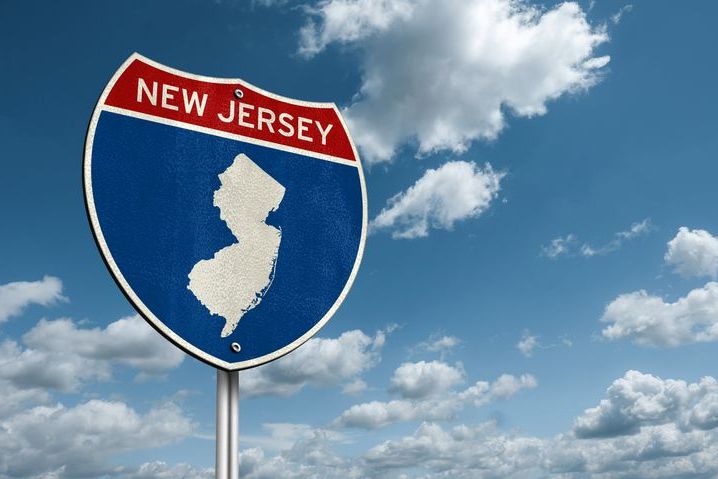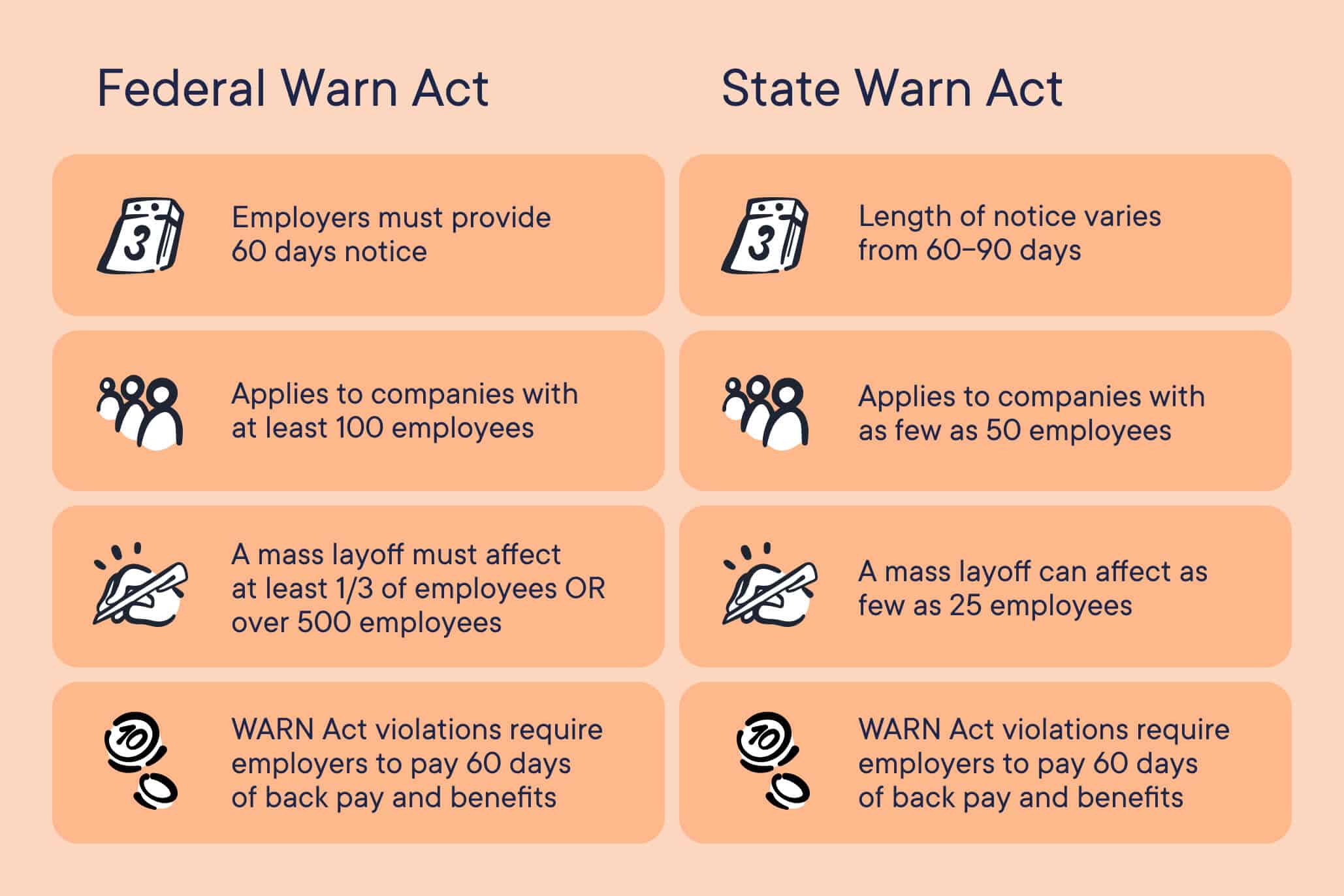
Preparing for a RIF?
Download our Essential Guide to Handling a Layoff
Request Pricing
Compare our rates to other providers
If you are planning to lay off employees in the state of New Jersey, you will need to make sure that you comply with all regulations pertaining to the Worker Adjustment and Retraining Notification Act (commonly known as the WARN Act). This will ensure that your employees are treated fairly and that you are not penalized for your layoff or reduction in force (RIF) event.
To understand how to comply with the WARN Act in NJ, we will have to look at three different areas:
- The federal WARN Act requirements
- The state-specific WARN Act requirements in NJ
- How to comply with NJ WARN Act laws
Before we get into our analysis for each of these areas, make sure to download our simple WARN Act checklist with the link below:
What Are the Federal WARN Act Regulations?
The WARN Act has several regulations that shape who the law should be applied to. This includes the following stipulations:
- The WARN Act applies to your organization if you have over 100 full-time employees.
- The WARN Act applies to all publicly and privately held companies.
- The WARN Act applies to all organizations that are for-profit or not-for-profit.
- A WARN notice must be given if there is a plant closing or a mass layoff.
The first three stipulations are relatively straightforward. The final stipulation, however, relies on the federal definition of a “plant closing” and “mass layoff,” which may vary from definitions set at the state level. We’ll get into that distinction for the state of New Jersey in a bit.
To comply with the WARN Act on the federal level, you will need to send a WARN notice to your affected employees 60 days in advance of their last day with the organization. Then your organization must also notify the government about your reduction event. This notice must also be sent 60 days in advance to your state dislocated worker unit, as well as to the chief elected official of the local government in which your employment site is located.
Now let’s dive into the state-specific requirements for the NJ WARN Act, and how that compares to the federal regulations above.

Does New Jersey Have a WARN Act?
As explained above, there are federal regulations resulting from the WARN Act that all states must abide by. In addition to that, some states also have more stringent regulations specific to the companies located in their state (as well as for employees working in that state, such as remote workers).
New Jersey is among those states which have tighter regulations that companies must follow. As of January 2023, New Jersey WARN Act legislation has become even more rigorous for employers, requiring them to provide impacted employees with a longer notice period, mandatory severance, and more.
One rule that has remained the same as the federal level is that the NJ WARN Act still only applies to organizations with over 100 employees. But let’s focus on the other differences that New Jersey enforces in their state WARN Act regulations.
NJ WARN Act Has Stronger Definitions
You may be wondering, what does the new 2023 law mean for laid off workers in NJ? The latest New Jersey WARN Act stipulates more stringent definitions on what constitutes a mass layoff or plant closing. Below are the definitions according to the NJ Department of Labor and Workforce Development:
Mass Layoff: “means a reduction in force which is not the result of a transfer or termination of operations and which results in the termination of employment at an establishment during any 30-day period for 50 or more of the employees at or reporting to the establishment, except that “mass layoff” shall not include a mass layoff made necessary because of a fire, flood, natural disaster, national emergency, act of war, civil disorder or industrial sabotage, decertification from participation in the Medicare and Medicaid programs as provided under Titles XVIII and XIX of the federal “Social Security Act,” Pub.L. 74-271 (42 U.S.C. § 1395 et seq.) or license revocation pursuant to P.L.1971, c.136 (C.26:2H-1 et al.).”
Plant Closings (or Termination of Operations): “means the permanent or temporary shutdown of a single establishment, or of one or more facilities or operating units within a single establishment, except that “termination of operations” shall not include a termination of operations made necessary because of a fire, flood, natural disaster, national emergency, act of war, civil disorder or industrial sabotage, decertification from participation in the Medicare and Medicaid programs as provided under Titles XVIII and XIX of the federal “Social Security Act,” Pub.L. 74-271 (42 U.S.C. § 1395 et seq.) or license revocation pursuant to P.L.1971, c.136 (C.26:2H-1 et al.).”
As you can see, NJ WARN Act regulations set a lower threshold than the US DOL definitions, which apply to any mass layoff which “will result in an employment loss at the employment site during any 30 day period for 500 or more employees, or for 50-499 employees if they make up at least 33% of the employer’s active workforce,” as well as any plant closing that “will result in an employment loss (as defined later) for 50 or more employees during any 30 day period.”
At the same time, these NJ WARN Act definitions also draw stricter lines to exclude reduction events that are the result of natural disasters, national emergencies, and other large uncontrollable events.
NJ WARN Act Requires Severance
While all states provide a response team to help displaced workers land new jobs, New Jersey takes it a step further, requiring employers conducting a mass layoff or plant closing to provide severance based on employment tenure.
According to the NJ DOL, these employers shall:
“Provide to each employee whose employment is terminated severance pay equal to one week of pay for each full year of employment. If the employer provides any employee with less than the number of days of notification required pursuant to subsection a. of this section, the employer shall provide that employee with an additional four weeks of pay.”
“The rate of severance pay provided by the employer pursuant to this subsection b. shall be the average regular rate of compensation received during the employee’s last three years of employment with the employer or the final regular rate of compensation paid to the employee, whichever rate is higher.”
While severance packages can be an excellent addition for impacted employees, we always suggest providing outplacement services to departing workers to help them land a new role as quickly as possible. A strong severance agreement and outplacement provider can make a world of difference for those being let go.
NJ Warn Act Has a Longer Notice Period
Starting in 2023, the NJ WARN Act began requiring impacted employees to be notified no less than 90 days before an applicable reduction event, or in the time period required at the federal level, whichever is longer.
This is an increase from previous years when employers were mandated to give at least 60 days notice, which is the same time frame required by the federal WARN Act that we mentioned earlier.
NJ WARN Act Has Different Notice Requirements
While the federal WARN Act requires giving notice to your government official, New Jersey also requires you to provide notice to the chief elected official of your local municipality, as well as to the Commissioner of the Labor and Workforce Development department.
Layoff laws in New Jersey also have more detailed requirements regarding what information must be provided to employees in their WARN notices. As the NJ DOL goes on to state, any such notice shall include:
- “A statement of the number of employees whose employment will be terminated in connection with the mass layoff or transfer or termination of operations of the establishment, the date or dates on which the mass layoff or transfer or termination of operations and each termination of employment will occur;
- A statement of the reasons for the mass layoff or transfer or termination of operations;
- A statement of any employment available to employees at any other establishment operated by the employer, and information regarding the benefits, pay and other terms and conditions of that employment and the location of the other establishment;
- A statement of any employee rights with respect to wages, severance pay, benefits, pension or other terms of employment as they relate to the termination, including, but not limited to, any rights based on a collective bargaining agreement or other existing employer policy;
- A disclosure of the amount of the severance pay which is payable pursuant to the provisions of subsection b. of section 2 [C.34:21-2] of this act; and
- A statement of the employees’ right to receive from the response team, pursuant to subsection c. of section 2 [C.34:21-2] and subsection a. of section 5 [C.34:21-5] of this act, information, referral and counseling regarding: public programs which may make it possible to delay or prevent the transfer or termination of operations or mass layoff; public programs and benefits to assist the employees; and employee rights based on law.”
NJ WARN Act Requirements: Key Takeaways
While the WARN Act is simple enough to understand on a federal level, some states—including New Jersey—have more stringent laws to protect local workers from mass layoffs and plant closings. This guide covered many of the key differences, but always be sure to refer to the NJ DOL website for the most comprehensive and up-to-date explanation of the law.
Understanding NJ WARN Act requirements is vital if you do any business in the state of New Jersey, especially since the law is constantly evolving year after year. If you are planning a mass layoff or reduction event in NJ, please consult your legal team to ensure you are following all applicable local, state, and federal laws.
For information on the specific WARN Act requirements in other states that may apply to your organization, see our similar WARN Act state guides for New York, Illinois, and California.
Remember, it can be extremely helpful to offer outplacement services to employees in New Jersey who are affected by any such plant closing or mass layoff event. These services can help support their transition and provide a solution for any issues that may arise. Consult with your legal team and company stakeholders about what solutions might be right for your organization to help you navigate the complexities of your reduction event.
In need of outplacement assistance?
At Careerminds, we care about people first. That’s why we offer personalized talent management solutions for every level at lower costs, globally.


